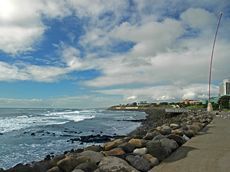 The self-propelled barge, Brandywine, has been seen during the last three weeks near the Pohokura production platform.
The self-propelled barge, Brandywine, has been seen during the last three weeks near the Pohokura production platform.
The ship is owned by Wellington company Seaworks, but it is not known who has contracted the ship to work in the area.
Sources told the Taranaki Daily News that crew come and go from the vessel aboard the Star Keys.
Taranaki Regional Council director of resource management Fred McLay said the vessel was just taking some samples from the sea bed and that did not require consent.
"Nobody has made a resource consent application for mining activity, this is just prospecting."
Mr McLay said if there was a sea bed mining proposal put forward it would be publicly notified.
The latest surveying activity follows a statement last year from Christchurch businessman John Rutherford, of Iron Ore NZ, that New Plymouth would be the ideal spot for an ironsand smelter large enough to employ 10,000 people.
Iron Ore NZ began prospecting off the Taranaki coast in 2005.
However, no resource consent to begin mining has been granted to them or Trans Tasman Resources, who have also prospected in the area.
Surf Break Protection Society vice president, Allen Pidwell, said they were strongly opposed to ironsand mining off-shore, largely because no research had been completed to determine what the effects there would be on the environment.
"If you dig a hole out of the sea, ultimately all the sand will drift down and it will destroy all life on the sea bed."
"I know everyone I talk to who goes to the beach is against this mining, despite what Mr Rutherford says."
New Plymouth sea captain Dave Chadfield said from a fisherman’s perspective ironsand mining would be devastating to the industry.
"It may bring a few jobs but it will kill a lot of fish larvae.
"Sucking the sand from the sea has a hell of an effect on those larvae," he said.
He did not know how they could mine without disturbing the breeding of seafood such as gurnard, cockles and pipis.
"Apparently they did it in the Philippines and it stuffed their fisheries," he said.
Onshore ironsand mining was a preferable prospect as it reinstated land to a better use than it previously had been, he said.
In 1971 onshore ironsand mining operations began near Waverley, which produced 15.7 million tonnes for export.

